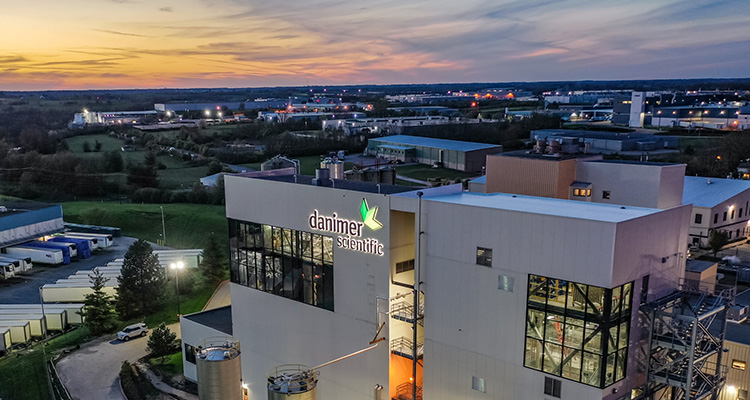How Danimer Scientific is helping to rid the world of plastic pollution
Danimer Scientific emerged in 2004 and quickly gained a reputation for being able to functionalize poly lactic acid (PLA) for some particularly tricky applications. CEO, Stephen Croskrey outlines this initial development: “PLA is made from corn starches; it’s a renewable material that can be industrially composted in the presence of heat and moisture. We developed an extrusion coating product derived from PLA for coffee cups, which come into contact with both heat and moisture making them a challenging application for the material. This not only put us on the map but also developed our key competencies around formulating products and developing applications.
 “The next major development came when we transitioned to using polyhydroxyalkanoates (PHAs) which are produced in nature by bacteria. When the bacteria break down materials like dead leaves, they store the carbon as an energy reserve in a similar way to how humans store fat. We’ve figured out how to produce this in an industrial process utilizing fermentation. We feed the bacteria canola oil, then break down the cell wall to extract the PHA. The real beauty of the process is that it works just like in nature, our products will break down over time as soon as they’re exposed to these bacteria which are everywhere in our soils and water, literally all around us. What we are trying to do is help rid the world of plastic pollution.”
“The next major development came when we transitioned to using polyhydroxyalkanoates (PHAs) which are produced in nature by bacteria. When the bacteria break down materials like dead leaves, they store the carbon as an energy reserve in a similar way to how humans store fat. We’ve figured out how to produce this in an industrial process utilizing fermentation. We feed the bacteria canola oil, then break down the cell wall to extract the PHA. The real beauty of the process is that it works just like in nature, our products will break down over time as soon as they’re exposed to these bacteria which are everywhere in our soils and water, literally all around us. What we are trying to do is help rid the world of plastic pollution.”
Stephen goes on to explain the product offering: “For the last four years our primary product has been a PHA-based formulation used to make straws. We’re working with partners like Starbucks®, so whenever you see a green straw in a Starbucks in North America, that’s our material. This year we’ve expanded our PHA product offerings into coffee pods and are currently launching cutlery. We are also in the process of launching a new thermoforming product for lids as well as extrusion coatings for paperboard, primarily for hot and cold cups. Our primary focus area right now is products for quick serve restaurants, and the cutlery program is rapidly scaling up to reflect that. We’re also receiving a lot of requests to expand the offering into everything else these restaurants need beyond cutlery, cups, and straws.”
Expanding capacity
Stephen goes on to outline how the business approaches developing new products with its clients. “When a customer comes to us with a request for a product we start with the specifications. We then come up with a formula, test it in the lab and adapt it as necessary before moving onto the next stage, where the customer trials it at a smaller scale, ideally on smaller equipment. Following this is an iterative process of receiving feedback and fine tuning until there’s a product that works in the operating conditions it needs to at a commercial scale.”
To supply increasing levels of demand, Danimer Scientific has been scaling up its production capabilities. “Our first site in Winchester, Kentucky was a former fermentation facility when we purchased it,” Stephen explains. “We retrofitted the space to produce PHA and that’s been our manufacturing base since early 2020. Demand has since grown so significantly that we need to expand our facilities to meet it. We will do this by working with the Department of Energy and with financing from the Treasury to complete our first greenfield site in Bainbridge, Georgia. We aim to have this facility operational within the next few years. This reassures our customers that have come on board recently that we will have the capacity to meet their needs as they grow.”
Future aspirations 
While Stephen can’t reveal any trade secrets, he outlines how some recent innovations in production processes are pushing the business forward. “Because we were the first to do this process commercially, we have a competitive advantage. We continue to learn and refine our process on a daily basis. In a lot of cases that means we are expanding our advantage over our competition as we are constantly making small improvements and optimizing production capability.”
There are a number of partners that have been central to the monumental growth Danimer Scientific is experiencing. “Our partnership with PepsiCo has been very important to our growth,” Stephen explains. “They funded our first pilot plant expansion and have been a fantastic partner over the years. We’re also currently working with Kemira and Mars Wrigley on various applications, such as flexible packaging for SKITTLES®.
“As of the end of 2024, we will have completed the scale up of our cutlery grade production, which will involve working with one of the world’s largest quick serve restaurant chains,” Stephen adds.
Looking further ahead, Stephen has the highest aspirations for the company. “In five years,” he says, “I would expect us to be in a dominant position in the market. Our greenfield site will be up and running, giving us by far the greatest capacity available for the best biopolymer in the world.”
Having refined its highly technical processes over the years, as the business has developed new products and applications, Danimer Scientific is now positioned to transform sectors such as quick-serve restaurant chains looking to replace products they utilize with more sustainable alternatives. These products offer a solution that will maintain the utility that customers demand, but also, will breakdown when discarded into natural environments or compost, leaving behind no harmful materials. By harnessing a process found in nature, Danimer Scientific pursues its mission to help rid the world of plastic pollution by offering a more perfect polymer than traditional plastics, without compromising on quality or performance.

